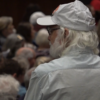April 21, 2013. The Post and Courier.
This was no ordinary church meeting. It was the largest and most diverse interfaith gathering the Charleston area has seen in decades.
The unusual size of the crowd, about 600, surprised the Rev. Nelson Rivers III of Charity Missionary Baptist Church in North Charleston. It surprised the Rev. Danny Massie of First (Scots) Presbyterian Church. It surprised the Rev. Jeremy Rutledge of Circular Church.
So many people streamed into the sanctuary at St. James Presbyterian Church on James Island for the rally that extra chairs had to be unfolded in the aisles. Signs taped to the ends of pews indicated where each congregation should sit.
Many churches and one synagogue were represented. Wallingford Presbyterian brought 17 people; Blessed Sacrament Catholic Church brought a dozen; Holy Communion had 21. Kahal Kadosh Beth Elohim brought 24. The Unitarian Church had 55. New Tabernacle Fourth Baptist had 18.
They kept coming, for this was a seemingly pivotal moment in a new effort to address social ills in the community. Religious leaders, along with their congregations, were taking the bull by the horns.
They have formed a new organization called the Charleston Area Justice Ministry, hired a director and adopted the methodology of a Miami-based group called the Direct Action and Research Training Center, or DART.
‘Bring three’
The Justice Ministry has been ramping up for a year. It began as a small cluster of clergy who met to find common ground. They engaged members of their respective congregations, began to build relationships and started the process of ascertaining community concerns. This was the first step, the “listening phase.”
The second phase was the “research-to-action process.” More people were engaged. Committees were formed. Problems were assessed. Stakeholders and policymakers were identified. This led to a big meeting at Blessed Sacrament Church at which participants settled on two pressing issues — education and crime — then went off to conduct research, hold meetings with school and law enforcement officials and begin to prepare for the third phase.
“It is a very democratic process, almost by necessity,” said the Rev. Joseph Darby, Justice Ministry co-president and a presiding elder of the AME Church.
Various houses of faith, each with its own set of views and priorities, are involved. So it is important to target issues around which a consensus can be built.
As organizers gathered information, it became clear that ensuring all children receive a quality education was critical, according to Massie, who has been involved from the start. Studies show that third-graders who are not yet literate are significantly more likely to lag behind and falter in school, and they also are more likely to get in trouble with the law. The correlation between early childhood education and prison rates is clear, Massie said.
As the Justice Ministry efforts intensified, so did interest among congregations. The April 8 rally at St. James Presbyterian Church served to take the temperature of this nascent faith-based movement. Many clergy and laypeople addressed the gathering, offering encouragement and updates, and promising to bring others to the next event, the Nehemiah Action, scheduled for 7 p.m. April 29 at St. Matthew Baptist Church in North Charleston. The mantra was: “Step up by showing up, and BRING THREE.”
If each participant of the rally succeeds in bringing three others to the action, attendance will exceed 1,500. Joining the April 29 assembly will be school and law enforcement officials, legislators and community leaders, including area mayors Joe Riley, Keith Summey and Billy Swails, police chiefs Greg Mullen and Eddie Driggers, Charleston County Sheriff Al Cannon and Charleston County School District Superintendent Nancy McGinley, according to organizers.
Good tension
About 20 congregations are officially involved in the Justice Ministry. But that number is likely to increase, Massie said.
It’s essential to boost the momentum and transition to the sustainable action phase in which investments can be made and pressure on policymakers applied, Darby said.
“This can’t be a rally to rally, it’s got to be ongoing,” he said, adding that it has to result in the building of an influential grass-roots power base.
At the April 8 rally, education committee member Cynthia Smalls told attendees that the Justice Ministry would push the school district to provide preschool education to all 4-year-olds in Title I schools. She said the ministry would promote implementation of a research-based curriculum and ask officials to track children’s progress through the third grade, a key turning point for young students.
All children in the region deserve a quality education, she said. “Geography, race and income should not matter.”
Frank Hardie, co-chairman of the crime and violence committee, cited some miserable statistics. More than half of juveniles who are detained eventually are jailed as adults, he said. Children who drop out of high school are far more likely to get in trouble with the law than those who finish their schooling. Nonviolent young offenders too often are corralled in the Charleston County Juvenile Detention Center with violent offenders, who are bad role models and expose children to dangerous ideas and lifestyles.
It is not uncommon for a 12-year-old arrested for a minor nonviolent offense to be jailed with a 17-year-old violent criminal, Hardie said.
The crime committee is talking with the Charleston Youth Development Center about finding a way to help young people who have run afoul of the law stay in school and avoid a life of crime, he said.
Rabbi Stephanie Alexander said that the group likely will encounter some tension as it asks policymakers and legislators to change the status quo. But tension sometimes is necessary for change to occur, she said.
“We (all) want what is best for our city and its residents. Our job is to bring the brokenness to light,” Alexander said.
Playing catch-up
Jerod Frazier, a 37-year-old activist, law student, minister of social justice at Charity Missionary Baptist Church and member of the crime and violence committee, said the meetings he has attended have been well-organized discussions.
“The energy is palpable in the room,” Frazier said.
Not only does the committee pore over data and other information, it records its discussions and rehearses its presentations. So when representatives meet with policymakers, they are efficient.
“We are on point, we have done the research,” he said. “We’re not pointing fingers, we’re presenting problems. We are essentially their think tank.”
The Rev. Bruce Jayne, a retired chaplain and a member of the education committee, was involved in a similar interfaith effort a few years ago, but it fell apart due to procedural and theological disagreements. Jayne said he was surprised at the lack of major obstacles this time around and credited the success of the Charleston Area Justice Ministry to its clear focus and common purpose and to the framework provided by DART.
“I’ve been here 23 years in this area,” Jayne said. “This is the first time I’ve seen any real result of churches working together across denominational lines. The beneficial, long-term side effect of this movement is it’s bringing the faith community together in a real way.”
Everyone agrees that education is the key, he said. If early childhood education is widely available and juvenile detention mitigated, then the high dropout rates will be attacked from two directions, he said.
“We just need to play some catch-up ball; we’re in a society that’s held back a significant part of our population by reducing their opportunity to have decent incomes,” Jayne said.
But it’s a long process, he said.
Churches and synagogues historically have done a good job with their “mercy ministries,” providing emergency aid to those in need, “but that doesn’t address systemic issues that cause people to live in poverty in the first place.”
This new Justice Ministry, which is tackling the causes of poverty and crime, probably will expand its scope in the years to come and, hopefully, provide a model for other South Carolina cities, Jayne said.
“Over time, we are going to see some significant change here,” he said. “It’s not only going to help poor people, it’s going to help the whole state.”
Where self-interest lies
DART, founded in 1982, works with about 20 organizations, including the Charleston Area Justice Ministry (which is soon to become a standalone nonprofit). About half are in Florida, where DART is based. Its recruiting institute is in Kansas, and its training center is in Ohio.
Local groups decide for themselves what issues to tackle and DART provides organizational framework, said John Calkins, executive director.
It also offers a biblical justification, drawn primarily from Micah 6:8, which reads: “He hath shewed thee, O man, what is good; and what doth the Lord require of thee, but to do justly, and to love mercy, and to walk humbly with thy God?”
“To do justly” is something nearly all people of faith can agree on, he said. Hot-button social issues such as abortion and gay marriage are avoided in favor of education, health care, crime and justice, unemployment, discrimination and more.
Treva Williams, the 36-year-old director of the Justice Ministry, moved to Charleston from Kansas last June after completing DART training and apprenticing as a fellow for five months with the group called BREAD (Building Responsibility, Equality and Dignity) in Columbus, Ohio.
Williams thinks of herself as a facilitator; she doesn’t dictate, she stands by as local faith leaders call the shots.
“The reason this works is because the work is done in the congregations, and the local people, the lay leaders and clergy, are the ones doing the work,” she said. “We try very hard to build relationships, to recognize where self-interests lie, and why it’s better for all of us if the city is more just.”
By 2015, the organization will include 50 local congregations. That’s the goal, she said.
Through the Justice Ministry, residents of the Lowcountry can gain a voice and influence public policy, she said.
“We tend to hand over so many things in our lives to the experts, and then so many years later wonder what happened.”
By 2015, the organization will include 50 local congregations. That’s the goal, she said.
Frazier, a former police officer who once was arrested on a violent offense but exonerated, said he has gained sympathy for people who are struggling to get by and respect for those unafraid to speak truth to power.
Change, he said, is necessary. Too many young people are stigmatized by criminal records and poor education. Too many lives are wasted or destroyed.
“So now our focus is to bring the message to leaders who want change that we will support you, we have your back,” he said. “And to those who don’t want change — we will not be silent.”





